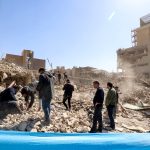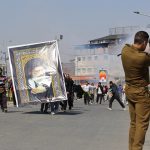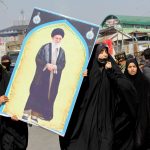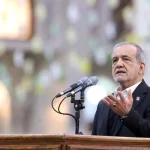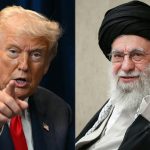
Street protests rocked Sudan’s capital Thursday, a day after security forces were reported to have shot dead 15 protesters, raising more concern over the crisis that was sparked by the military’s October 25 takeover.
Witnesses gave accounts of police firing tear gas to disperse dozens of anti-coup protesters who had stayed overnight on the streets in the north of the country’s capital Khartoum, braving the gradually intensifying crackdown that has drawn international condemnation. Police were seen tearing down makeshift barricades the protesters had erected the previous day. More witnesses said that later in the day, dozens of protesters returned to rebuild them leading to the police again firing tear gas in a bid to clear the streets.
“Protesters responded by hurling stones at the police…” one witness said.
On October 25, top General Abdel Fattah al-Burhan, Sudan’s de facto leader since the April 2019 ouster of longtime president Omar al-Bashir, detained the civilian leadership and declared a state of emergency. The move suspended Sudan’s fragile transition to full civilian rule, and has since drawn international condemnation and a series of punitive measures and aid cuts.
US Secretary of State Antony Blinken told Sudan’s military the country stood to regain the much needed international aid if it restored the “legitimacy” of civilian government. Washington has also in response to the crisis suspended some $700 million in assistance to Sudan since the coup.
“If the military puts this train back on its tracks and does what’s necessary, I think the support that has been very strong from the international community can resume…” said Blinken.

US Assistant Secretary of State for African Affairs Molly Phee has been shuttling between the generals and the ousted civilian government in a bid to broker a way out of the crisis. Phee has called for the reinstatement of ousted Prime Minister Abdalla Hamdok, who is currently under house arrest. The few remaining free members of Hamdok’s cabinet on the other hand continue to describe themselves as the “legitimate” government and refuse to negotiate with the military leaders.
Burhan insists that the military’s move “was not a coup”. Last week he announced a new Sovereign Council, the highest transitional authority, with himself as chief and all nine military members keeping their posts; its four civilian members were replaced.
He has also removed a clause in the transitional constitutional declaration that mentions the Forces for Freedom and Change, the key group behind the protests that toppled Sudan’s authoritarian President Omar Al Bashir. Also, he has continued to promise elections will go ahead as planned in 2023, reiterating to Phee on Tuesday that his actions aimed to “correct the trajectory of the revolution”.
Those protesting the military takeover in Khartoum and other cities have been met with a deadly crackdown since the coup. Medics said at least 15 people have been killed, most of them in north Khartoum, raising the toll since the coup to 39. Police however said they had recorded only one death among protesters in north Khartoum, with another 30 suffering breathing difficulties from tear gas inhalation. They also said they had fired no live rounds and used only “minimum force”, even as 89 officers were wounded, some of them critically.

The latest demonstrations were organised despite a near-total shutdown of internet services and the disruption of telephone lines across the country.
By Thursday morning, phone lines had been restored but internet services remained largely cut, and bridges connecting Khartoum with neighboring cities reopened and traffic returned to many of the capital’s streets.
Prior to 2019, Sudan had been under some form of military dictatorship for much of its modern history.

